
SPIXIANA
metrics 2024
Unveiling the Secrets of Animal Biology
Introduction
SPIXIANA is a distinguished journal dedicated to the fields of animal science and zoology, published by VERLAG DR FRIEDRICH PFEIL in Germany. With the ISSN 0341-8391, it has been contributing to the scientific community since its inception, with volumes converging from 2008 to 2024. Although currently listed in the Q4 quartile of the 2023 category rankings for Animal Science and Zoology, it provides a vital platform for researchers and professionals to disseminate significant findings in the field. Despite being unindexed in open access, SPIXIANA ensures that vital research reaches its audience, enhancing academic discourse and furthering our understanding of zoological sciences. Its commitment to sharing rigorous scientific research make it an important resource for anyone passionate about animal biology and conservation.
Metrics 2024
 0.20
0.20 0.60
0.60 0.60
0.60 15
15Metrics History
Rank 2024
Scopus
IF (Web Of Science)
JCI (Web Of Science)
Quartile History
Similar Journals
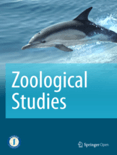
ZOOLOGICAL STUDIES
Connecting research and impact in zoological studies.Zoological Studies, published by the Biodiversity Research Center, Academia Sinica, stands as a pivotal journal in the fields of animal science and zoology. With the ISSN 1021-5506 and E-ISSN 1810-522X, this Taiwanese journal features a blend of pioneering research that spans over three decades, from 1994 to 2024, fostering a deep understanding of biodiversity and zoological phenomena. Recognized for its scholarly contributions, Zoological Studies holds an esteemed Q2 ranking in Animal Science and Zoology for 2023, positioning it among the top-tier journals in its category with a Scopus rank of #164 out of 490—reflecting its strong impact and outreach. While currently not open access, the journal aims to disseminate essential findings and discussions that advance ecological knowledge and inspire future research endeavors. Researchers, professionals, and students alike will find this journal an invaluable resource for accessing critical studies that drive innovation and conservation efforts in the field of zoology.
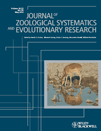
JOURNAL OF ZOOLOGICAL SYSTEMATICS AND EVOLUTIONARY RESEARCH
Connecting the Dots of Animal Science and EvolutionThe Journal of Zoological Systematics and Evolutionary Research, published by Wiley-Hindawi, stands as a premier academic journal since its establishment, showcasing cutting-edge research in the fields of Animal Science, Zoology, and Ecology. With an impressive track record spanning from 1963 to the present, this journal has earned a Q1 classification in both Animal Science and Ecology, as well as recognized rankings in Genetics and Molecular Biology. Its impact is highlighted by its Scopus ranks, placing it in the top percentile for relevant categories, underscoring its vital role in advancing knowledge and understanding within these disciplines. Researchers, professionals, and students will find a wealth of high-quality, peer-reviewed articles that contribute to the evolutionary understanding of biodiversity and systematics. Though not an Open Access journal, it remains accessible to a wide audience committed to exploring the intricacies of zoology and evolutionary biology.
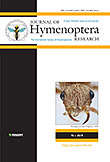
JOURNAL OF HYMENOPTERA RESEARCH
Empowering Global Collaboration in Entomological StudiesJOURNAL OF HYMENOPTERA RESEARCH is a leading open-access publication dedicated to the advancement of knowledge in the fields of Insect Science, Animal Science and Zoology, and Ecology. Published by Pensoft Publishers since 2011, this journal plays a critical role in facilitating the exchange of significant research findings and insights related to Hymenoptera, a diverse order of insects that includes bees, wasps, and ants. With a commendable impact factor and ranked in the Q1 category for Insect Science and Animal Science, the journal stands out within the scientific community, drawing contributions from researchers globally. Boasting an ISSN of 1070-9428 and an E-ISSN of 1314-2607, the journal not only ensures broad accessibility to its content but also fosters a collaborative environment for professionals and students alike to engage with pioneering research. By reflecting on the converged years of 2007-2024, the JOURNAL OF HYMENOPTERA RESEARCH remains a vital resource for understanding the ecological and evolutionary dynamics of this important group of insects, solidifying its position as a cornerstone in entomological studies.

ANIMAL BIOLOGY
Fostering Understanding of Life Sciences through Open AccessANIMAL BIOLOGY is a distinguished journal published by BRILL, focusing on the dynamic fields of Animal Science and Zoology, as well as Ecology, Evolution, Behavior, and Systematics. With an ISSN of 1570-7555 and an E-ISSN of 1570-7563, this quarterly journal serves as a pivotal platform for researchers and professionals seeking to contribute to the understanding of animal biology across diverse ecological contexts. The journal is recognized with a 2023 Scopus ranking of #234 out of 490 in the Animal Science and Zoology category, placing it within the 52nd percentile, alongside a rank of #409 out of 721 in Ecology, marking a solid contribution to the field. Although it currently holds a Q3 quartile in both categories, its commitment to quality research and novel insights continues to bolster its significance within the academic community. The open access option coupled with its publication history from 2003 to 2024 ensures a wide dissemination of knowledge, drawing in a global audience of researchers, professionals, and students eager to explore the intricacies of animal biology. By promoting high-quality discussions and innovative studies, ANIMAL BIOLOGY plays an essential role in advancing the understanding of life sciences and the evolution of biodiversity.

TAIWANIA
Unveiling the complexities of our natural world.TAIWANIA is a prestigious and long-standing journal dedicated to the fields of ecology, evolution, and systematics, published by NATIONAL TAIWAN UNIVERSITY PRESS. Since its inception in 1947, this open-access journal has provided a vital platform for researchers to disseminate their findings, encouraging collaboration and innovation in the ecological sciences. With a 2023 impact factor placing it in Quartile 2 for Ecology and Quartile 3 for Ecology, Evolution, Behavior and Systematics, TAIWANIA is recognized for its quality and influence, ranking #267 out of 461 in Environmental Science and #426 out of 721 in Agricultural and Biological Sciences within Scopus. The journal currently publishes contributions from both local and international researchers, showcasing a diverse array of topics that address crucial ecological issues and facilitate the advancement of knowledge in the discipline. For those seeking rigorous research, engaging reviews, and a commitment to open access, TAIWANIA remains a significant resource for the global scientific community.

GAYANA
Advancing knowledge in Animal and Aquatic Sciences.GAYANA is a pioneering journal in the fields of Animal Science and Zoology and Aquatic Science, published by EDICIONES UNIV, CONCEPCION in Chile. With an ISSN of 0717-652X and an E-ISSN of 0717-6538, this journal has been at the forefront of research dissemination since its inception in 2006. Recognized in 2023 with a Q4 quartile ranking in both its categories, GAYANA provides a platform for researchers and practitioners alike to explore and publish their findings. Despite its relatively new establishment, the journal has carved a niche in aquatic and animal research, as evidenced by its Scopus ranks in the 12th and 7th percentiles, respectively. With challenges in access options, GAYANA emphasizes the significance of open scholarly communication, fostering an academic environment where knowledge is shared and advanced. Contributing to GAYANA means being part of a growing community dedicated to understanding and conserving our natural world.

BELGIAN JOURNAL OF ZOOLOGY
Pioneering Discoveries in the World of Animal Science.The BELGIAN JOURNAL OF ZOOLOGY, published by the Royal Belgian Zoological Society, serves as a prominent platform for advancing research in the field of zoology. With an impact factor reflecting its status within the academic community, this journal rigorously publishes innovative studies and reviews, covering a broad spectrum of topics related to animal science and zoology. As an esteemed outlet, the journal ranks in the Q2 category for both Animal Science and Zoology, demonstrating its relevance and contribution to the field, as indicated by its Scopus ranking of 255 out of 490. Although it operates under a subscription model, the journal is committed to disseminating high-quality research that can shape contemporary understanding of animal biology and ecology. With a publication history dating back to 1990 and extending through 2024, researchers, professionals, and students are encouraged to engage with its rich content, which is vital for ongoing discourse and discovery within zoological sciences.
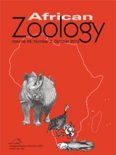
AFRICAN ZOOLOGY
Exploring Africa's Rich BiodiversityAFRICAN ZOOLOGY, published by Taylor & Francis Ltd, stands as a significant journal in the realm of Animal Science and Zoology, with a proud history dating back to 1996 and slated to continue until 2024. With an ISSN of 1562-7020 and E-ISSN 2224-073X, this journal provides a reputable platform for researchers and practitioners dedicated to the study of animal biology across the African continent. It has been recognized for its quality scholarship, evidenced by its Q3 categorization in the 2023 Scopus quartile rankings and an impressive rank of #182 out of 490 within its field. As an open-access journal, it facilitates the dissemination of vital research findings and promotes broader accessibility, catering to a diverse audience of professionals, scholars, and students alike. The journal aims to enhance our understanding of wildlife, conservation, and ecosystem dynamics in Africa, fostering collaborations that address critical ecological challenges. For researchers and enthusiasts keen on contributing to and staying informed about advancements in zoological science, AFRICAN ZOOLOGY is an essential resource that enriches the global discourse on biodiversity and conservation efforts.
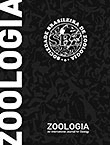
Zoologia
Unlocking the Secrets of BiodiversityZoologia, published by the SOC BRASILEIRA ZOOLOGIA and UNIV FEDERAL PARANA, is a premier open-access journal dedicated to the field of zoology and related disciplines. Established in 2009 and based in Brazil, this journal has quickly positioned itself as a vital resource for researchers, professionals, and students, providing a platform for innovative research and comprehensive reviews in animal science and zoology. With an H-index indicative of its growing citation impact and a current Scopus ranking placing it in the 46th percentile of its category, Zoologia focuses on increasing the visibility and accessibility of cutting-edge zoological research. The journal aims to advance the understanding of animal biology, ecology, and conservation, making it an essential read for those invested in animal science. As an open-access publication, it ensures that knowledge dissemination is unrestricted, fostering a collaborative scientific community striving towards impactful conservation and biodiversity initiatives.
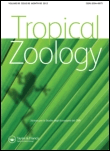
TROPICAL ZOOLOGY
Deepening our understanding of tropical ecosystems.TROPICAL ZOOLOGY is a prestigious academic journal dedicated to advancing knowledge and research in the fields of animal science, zoology, and ecology. Published by PAGEPRESS PUBL, this journal has been an integral part of the scientific community since its inception in 1988, providing a platform for the dissemination of innovative research and discoveries related to tropical wildlife and ecosystems. With an impact factor placing it in the Q3 category for both Animal Science and Zoology, as well as Ecology, Evolution, Behavior, and Systematics, it ranks among the noteworthy publications in these fields. Researchers, professionals, and students will find that TROPICAL ZOOLOGY is an essential resource for the latest findings, fostering a deeper understanding of biodiversity and conservation in tropical environments. The journal is based in the United Kingdom, with additional administrative support from MEDIGROUP in Italy, ensuring a broad international perspective and reach. While it does not operate under an open access model, it remains committed to high-quality peer-reviewed content that contributes significantly to the understanding of tropical ecosystems and the species that inhabit them.